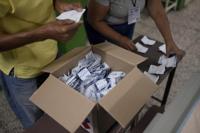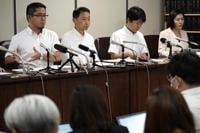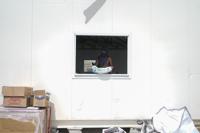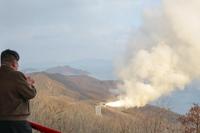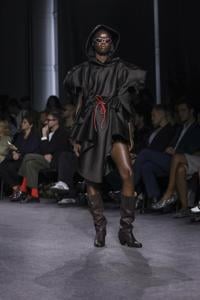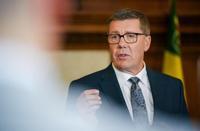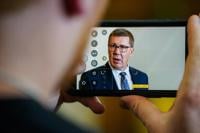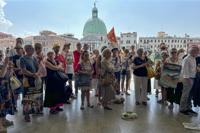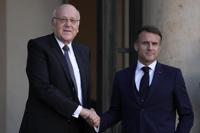MIAMI (AP) — It was a rare diplomatic gamble when the three leaders of Latin America's largest democracies inserted themselves into the high-stakes standoff between Venezuela’s Nicolas Maduro and his opponents over who won the country’s presidential election.
Dubbed the three amigos — all dyed-in-the-wool leftists who have been friendly with Maduro — the presidents of Brazil, Colombia and Mexico broke from decades of hands-off diplomacy toward Venezuela and their own reluctance to meddle in a neighbor’s sovereign affairs in a region where U.S. military interventions during the Cold War still generate resentment.
But some experts say the is losing steam before barely getting off the ground.
They cite misgivings by Mexico’s outgoing president, divisions among Latin America’s left and pressure from the U.S. on Maduro to recognize defeat and step aside. The main outcome so far, they say, has been to grant Maduro precious time to consolidate his rule and since the July 28 vote.
“The mediation effort is cautious, focusing on avoiding conflict and a new migration wave rather than defending democracy,” said Daniel Lansberg-Rodriguez, a Venezuelan born analyst and founder of Aurora Macro Strategies, a geopolitical risk consulting firm based in New York.
“It’s hard to be optimistic,” adds Michael Shifter, the former president of the Inter-American Dialogue in Washington.
The diplomatic effort by Brazil's Luiz Inácio Lula da Silva, Mexico's Andrés Manuel López Obrador and Colombia’s Gustavo Petro to resolve the dispute over the election outcome was initially heralded by many in Venezuela’s opposition and the U.S., which was happy to leave that political minefield to others.
Lula, who dispatched a close aide to Caracas to monitor the vote, refused to recognize Maduro’s claim of victory. Joined by López Obrador and Petro, he also called on Venezuelan authorities to publish detailed tallies of election results — as it has traditionally — to back their claim that Maduro won.
“If there are doubts ... then count the votes,” López Obrador said in his first remarks after the election.
Opposition politicians have said they obtained tally sheets and that they show challenger Edmundo González winning by a two-to-one margin, which has prompted the U.S. and dozens of other countries to say that González garnered the most votes.
Brazil, Mexico and Colombia have not joined those countries, trying instead to get Maduro to release the disaggregated results. But as weeks have passed, and as the Venezuelan government's crackdown on the opposition has continued, the trio has lost some of its mojo. A long-discussed phone call between the presidents and Maduro has yet to take place.
Recently Lopez Obrador suggested he would take a step back from the effort to await the results of an , which is packed with Maduro loyalists and has almost never ruled against the government.
Meanwhile, Lula angered many in the opposition by saying he favors a do-over of the election.
“We don’t know really how committed they are to a transition to democracy,” said Javier Corrales, a professor of Latin American politics at Amherst College in Massachusetts. “Maybe in private circles they are putting pressure on Maduro to step down but in their public statements there’s no evidence that this is a priority. They mostly talk about stability and avoiding bloodshed.”
The U.S. has been all too willing to sit on the sideline after years of failed efforts by the Trump administration to oust Maduro. The Biden administration, while condemning the apparent steal, hasn’t retaliated or gone as far as the opposition in recognizing González as president-elect. Instead, it prefers to give political space to the diplomatic dealmaking, especially since the next presidential term doesn’t start until January.
However, behind the scenes, it has been sharing its views with the trio, with U.S. Secretary of State Antony Blinken recently speaking to his Mexican counterpart, Alicia Bárcena, while President Joe Biden and Canada’s Prime Minister Justin Trudeau both dialed up Lula.
Unlike Venezuela's neighbors, the U.S. has real leverage over Maduro that could make it impossible for him to for the next six years. That includes debilitating oil sanctions that have all but shut the OPEC nation out of Western markets and are contributing to shortages and an ongoing economic crisis. There’s also a $15 million bounty for Maduro’s arrest to face drug trafficking charges in the U.S.
Any exit plan for Maduro would likely involve some sort of amnesty for the president and dozens of others who are accused of corruption, drug trafficking and human rights abuses.
Thomas Traumann, a Brazilian political consultant, said that Lula and his partners emerged as “the adults in the room” after a string of U.S. policy failures.
“Where have U.S. sanctions led us?” said Traumann, who was previously the spokesman for Dilma Rousseff, a member of Lula's Workers' Party and president from 2011 to 2016. “Over the past 20 years, the U.S. has tried sanctions, freezing foreign reserves, recognizing a puppet president and even supporting a military coup in 2021 — all of which have failed.”
Still, he said it’s unrealistic for any foreign country — the U.S. or otherwise — to play more than a supporting role so long as Maduro has the support of the armed forces and powerful allies like Russia and China.
“This plan may not succeed — not because Lula and Petro are naïve or aren’t applying enough pressure on Maduro, but because there is little they can do to enforce it,” he said. “Any autocrat can survive international sanctions.”
—�Ĕ-
AP Writer David Biller in Rio de Janeiro, Brazil, Maria Verza in Mexico City and Astrid Suarez in Bogota, Colombia, contributed to this report.


